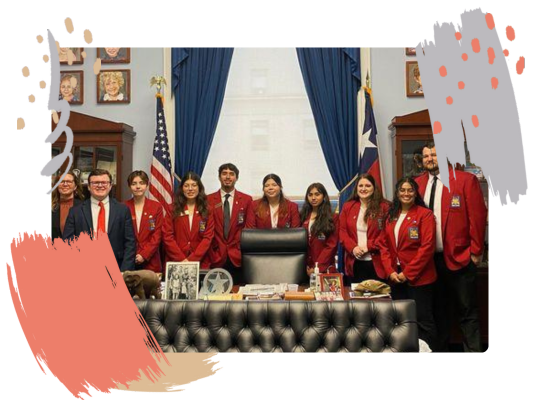
Find Texas Schools and Independent School Districts

Find Texas Schools and Independent School Districts

NEISD fourth grade Gifted and Talented (GT) students locate fingerprints.
Texas public schools offer a range of advanced academic programs that prepare students for college, careers, and beyond. Through specialized courses, assessments, and services, students can demonstrate college readiness, earn college credits, and qualify for scholarships like the National Merit Scholarship.

Cleveland ISD students visited their political representatives in Washington, D.C
Advanced academic opportunities available for students begin with Gifted and Talented programs in elementary school and progress to Advanced Academic Programs, such as Dual Credit and Advanced Placement (AP), in high school.
The Elementary and Secondary Education Act defines gifted children as:
Students, children, or youth who give evidence of high achievement capability in areas such as intellectual, creative, artistic, or leadership capacity, or in specific academic fields, and who need services and activities not ordinarily provided by the school in order to fully develop those capabilities.
The National Association for Gifted Children developed a positioning statement to guide best practices. The NAGC states, “Students with gifts and talents perform – or have the capability to perform – at higher levels compared to others of the same age, experience, and environment in one or more domains. They require modification(s) to their educational experience(s) to learn and realize their potential.”
College preparatory classes provide the foundation students need to succeed in postsecondary education. These core courses, required for high school graduation, offer rigorous academic preparation without reaching the advanced level of AP coursework. High-achieving students may later transition from college prep to AP classes.
Through dual credit and dual enrollment programs, high school students can simultaneously earn credit toward both a high school diploma and a college degree.
Advanced Placement (AP) courses allow students to take college-level classes while still in high school. High AP exam scores can lead to college credit and advanced placement in universities, reducing time and costs for a degree. Students interested in Advanced Placement programs have many options, including:
Q1: What is a Gifted and Talented (GT) program in public schools?
A: Gifted and Talented (GT) programs are designed to challenge students who demonstrate high levels of aptitude or academic achievement. These programs provide enriched, accelerated, or advanced instruction tailored to students’ unique learning needs.
Q2: What types of advanced academic programs do public schools offer?
A: Public schools may offer a range of advanced academics including Dual Credit, Advanced Placement (AP), International Baccalaureate (IB), and Honors programs. These help students earn college credit, explore challenging coursework, and prepare for future success.
Q3: How do students qualify for Gifted and Talented programs?
A: Qualification typically involves multiple criteria such as standardized test scores, teacher recommendations, classroom performance, and cognitive ability assessments. Each district follows specific guidelines aligned with state policies.
Q4: At what grade levels are Gifted and Talented services available?
A: GT services are available from elementary through high school in many public school districts. The types of programs and delivery methods may vary by grade level and district.
Q5: Are advanced academic programs available in all Texas public schools?
A: Most Texas public school districts offer a variety of advanced academic options. Availability may vary by campus, so it’s best to check with your local district for specific program offerings.
Q6: Can students earn college credit in high school through advanced academics?
A: Yes, students can earn college credit through programs like Dual Credit and AP courses. These programs allow students to take college-level courses while still in high school, saving time and money later on.
Q7: What is the difference between Advanced Placement (AP) and Dual Credit programs?
A: AP programs offer college-level coursework with a standardized national exam; college credit is based on exam performance. Dual Credit programs allow students to take actual college courses and earn credit through a partnering college or university.
Q8: How do I enroll my child in a Gifted and Talented or advanced academic program?
A: Contact your school or district to learn about the identification process, eligibility criteria, and enrollment steps. District websites usually have dedicated pages for GT and advanced programs.
Q9: Why should families consider GT and advanced academics in public schools?
A: These programs help students stay engaged, develop critical thinking skills, and reach their full potential. They also provide a competitive edge for college admissions and scholarships.
National Association for Gifted Children- Myths about GT classes and students
College Board- Advanced Placement Information
Texas Education Agency – Advanced Academics
Check out this quick video of what students learn in Advanced Academics. Advanced Academics provide students with opportunities to demonstrate college and career readiness.

If you want to take advantage of this benefit or learn more about how a membership can help your organization please click the button below.